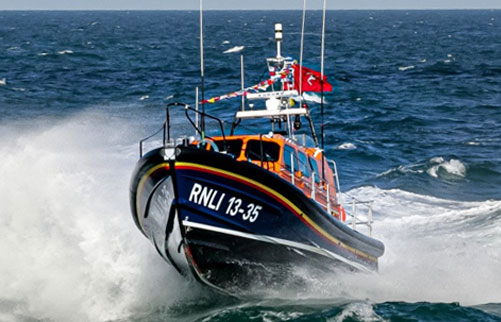HyJet - Hydrogen Jet Ignition for Marine Engines

20.02.2023

HyJet - Sustainable Propulsion Solutions for Retrofit
The HyJet project will begin by analysing usage data collected from the RNLI’s vessels during real-world operations to establish the fleet requirements and to help identify the optimum approach for clean operation.
This technology-agnostic approach will also consider the issue of on-board fuel storage and refuelling, critical to deployment in an emergency setting, and impact on vessel safety standards.
Headed by MAHLE Powertrain, the all-British consortium comprises Clean Air Power, providers of the critical fuel injection system, and the University of Nottingham’s renowned Powertrain Research Centre with responsibility for fuel storage assessment and testing. Hybrid Marine Power will act as a consultant, providing legislative impact analysis alongside their experience of marine safety standards and the wider industry.
The HyJet project aims to develop sustainable propulsion solutions for retrofit to high performance marine vessels where battery and other electrified technologies may not prove practical. The collaboration will initially target search and rescue vessels. The low energy density and high weight of current battery technologies, coupled with the need to quickly replenish for the next mission, means that alternative green propulsion solutions are required.
MAHLE’s Jet Ignition® (MJI) technology, optimised for hydrogen combustion under the name HyJet, enables the ignition of sustainable fuels in clean combustion engines. The project will aim to deliver retrofit solutions at scale across commercial, professional, and governmental fleets.
Victoria Limbrick, Carbon & Energy Manager for RNLI said, ‘The RNLI has committed to eliminating or reducing impacts on the environment and to become a low-carbon, climate-resilient organisation. Fuel for our lifeboats, rescue watercraft and logistics vehicles accounts for around 57 per cent of our total energy use. The HyJet project offers an exciting opportunity to investigate and learn about potential solutions that could help meet our challenging sustainability targets and to fulfil our ambition to move away from fossil fuels.’
Marine engines are typically designed with long service lives in mind and are fitted to vessels that are required to operate for many decades. Key to the success of HyJet is a focus on a cost-effective solution that can be retrofitted - a concept already proven by MAHLE Powertrain’s experience in the passenger car and heavy-duty sectors - opening the door to rapid decarbonisation of existing fleets.
Funded by the Department for Transport as part of the Clean Maritime Demonstration Competition, HyJet’s findings lay the foundations for a follow-on project to create a real-world demonstrator vessel. The project’s focus on commercialisation will establish a clear route to market that can be scaled throughout the marine sector, helping it to reduce greenhouse gas emissions and accelerate the transition towards net zero.
Jonathan Hall, Head of Research & Advanced Engineering at MAHLE Powertrain, is presenting on HyJet at the NEXT GEN Marine HYDROGEN Workshop via Zoom on 25 April 2023 - 13.00 to 17.00 (UK).
NEXT GEN Marine HYDROGEN Workshop >
All images are copyright NEXT GEN Marine Ltd 2025 unless otherwise stated.
This does not exclude the owner's assertion of copyright over the material.
















